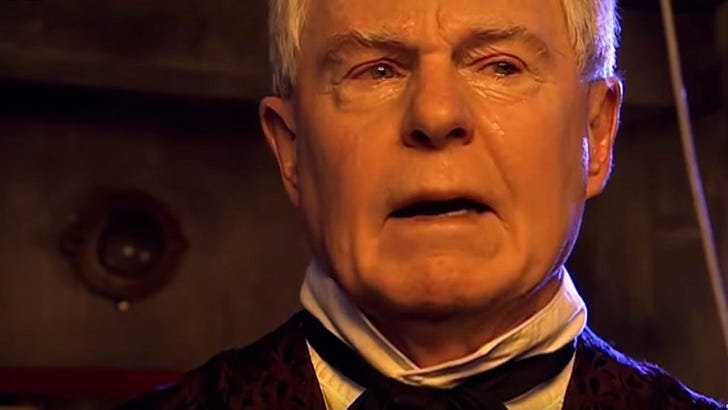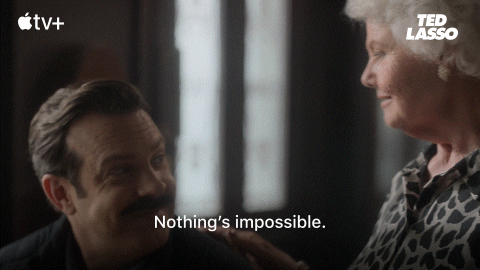As I write this, it’s about a week since I walked up to Sir Derek Jacobi at the Gallifrey One convention and told him how much I’ve enjoyed his work over the years, and thanked him for it. The conversation was maybe three minutes long, which was fine with me. I said everything I wanted to say, he replied most graciously and gratefully, and that was that.
Fun fact: Jacobi’s wanted to be on Doctor Who since the 60s—back in the days when it was anything but an international blockbuster TV series. He got his wish in 2008 when he played one of the show’s most iconic villains.
Let’s take a poll: how many of you would feel free to walk right up and say something like that to someone like Derek Jacobi? And how many of you would run screaming at the thought that you’d get up to whichever of your heroes you might want to talk to and either melt into a puddle of something unpleasant or make such a complete fool of yourself that you’d end up wishing you had?
Don’t worry: if you fall into the latter category, you’re not alone. I think most of us have had that fear—and lord knows, some of us have definitely made total idiots of ourselves around the people we admire.
I can’t imagine there’s a person alive who hasn’t worshiped a hero of some sort in their lifetime. By the time we’re teenagers, most of us have a crush on someone we’ve seen on a screen or heard on the radio, or both. If you’d put me in a room with Simon LeBon, Nik Kershaw, Sting, or Bono back when I was in high school, well, let’s just say I’d be hoping and praying for any videotape to have been wiped long ago, because I’m sure I would have made a complete eejit of myself by default, because as far as I could tell, they were the bees knees. Heck, I probably would have lost all ability to speak if you’d put me in the same room with Annie Lennox, who’s still one of my favorite performers ever, because she’s practically a goddess.
In our heads, we’re just ordinary peons—motes of dust, essentially—and our heroes are, well… heroes. They’re famous. They’re people we’ve built up into something superhuman. And the fact is, nobody can ever live up to that expectation. And this view of celebrity is why, as actor Sam Neill once said:
People turn into fools when they see a movie star and do weird things.
I have seen people lapse into a strange sort of fawning even with local celebs. By the same token, I’ve also watched people at conventions tell a guest everything that was wrong with one of their projects, paying no mind to the pained look on said guest’s face. And, of course, at this point, we’ve all seen social media interactions gone awry. None of it is pleasant to watch, and I don’t imagine it’s much fun on the receiving end, either. But our heroes exist for us, in our own heads, in the way we think they should, right?
Nope. A lot of people seem to think so, though, which is really unfortunate.
What we forget when we idolize folks is that they are still human. They’re just people like you and me. Okay, they have fame, and probably more money, and may never have worked a “regular” day job (though a lot of them have!), but those things aren’t what makes us human—or not. Underneath it all, we have the same basic wants and needs. We have our friends and families. We need to survive, so we need food and shelter and to take care of ourselves. We move around in the world, there are people we like and people we don’t, and there’s inevitably some chore or other that we don’t want to deal with, no matter how much money we have.
While it’s certainly not something I do every day, I’ve spoken with enough people at varying levels of fame at this point to be pretty sure that what most of them really want is to be treated like anyone else. And I’ve noticed that, as I’ve been around more well-known folks, my comfort level has shifted to a point where that’s all it occurs to me to do—and that makes those interactions much more fun for everyone.
Of course, some folks may want to be ignored completely, as in the case of David Tennant when a friend ran into him in a shop at Heathrow Airport a decade or so ago, clearly terrified of being spotted and mobbed by fans—as signified by the baseball cap pulled over his eyes—which she and the folks working in the shop recognized and respected, though they did have their own private freak-out once he was gone.
And some folks are just laid back enough that they’ll roll with whatever comes up and have fun with it. For instance, Annette Badland, Ted Lasso’s Mae, apparently sang the Roy Kent song with fans during one of her photo sessions last weekend. Not gonna lie—it didn’t happen during mine, and I’m crazy jealous!
Of course, the real reason folks say you should never meet your heroes is that there’s no guarantee they’ll live up to your expectations. Sometimes that means they turn out to be folks who are either “difficult” in one way or another or are having a rough day and aren’t handling it well. Or they could just be so shockingly ordinary compared to the image in your head that you can’t figure out what to do with it, as happened to a friend of mine once when she was interviewing her favorite author and he needed to take a minute to feed his cat. If we’ve built them up high enough in our heads, the disconnect can be devastating.
When I worked backstage as a volunteer at a local performing arts center after I finished undergrad, I met folks like the Chieftains (with Michael Flatley, before Riverdance), Victor Borge, the Canadian Brass, and Shari Lewis, and those experiences ranged from the sublime (Victor Borge was such a treat) to the painful (I won’t say who, especially since it may have been a one-off bad day, and I’m pretty sure they managed to pull off their show just fine regardless).
I don’t really agree that you should never meet your heroes, though. I’ve had too many good experiences to want to discourage anyone from taking advantage of that opportunity. The key is to remember that the other person is human, too, and nobody wants an awkward interaction. If you’d be uncomfortable if someone said something to you, you shouldn’t say it to someone else, which is honestly no different than dealing with anyone you might encounter. If you really aren’t sure what to say, or are afraid you’ll suddenly lose control of the words coming out of your mouth, you can never go wrong with a simple “Thank you” and a smile.
About 30 years ago, a friend of mine happened, as she was walking around the local shopping center where she worked over her lunch hour, to walk past someone she described as the spitting image of
. We later discovered he had been in town to film I.Q., so it was really him and not his doppelganger, as she had first guessed, since the odds of him turning up in Central New Jersey seemed vanishingly small. (No, I never stopped giving her hell for not saying anything, because that’s what friends are for.)For a great perspective on fame, what it’s like to be famous, and how a lot of people make fools of themselves around famous folks, and therefore what NOT to do should you happen to walk past someone on your lunch hour, I don’t think you can do any better than Mr. Fry’s own essay on the subject, penned back in 2007 but still enlightening and useful. I’ll admit I re-read it before meeting Sam Neill several years ago (several years before I started hanging around at Doctor Who events and gaining that aforementioned comfort level) and found its wisdom incredibly helpful in keeping me from making a complete moron of myself. Even if you’re not prepping for a close encounter of the celebrity kind, it’s a fascinating read. Fair warning: it’s long.
What do you think? Have you met any of your heroes? If so, how did it go? Would you do it again?






Not even a famous person. In frouth grade there was a girl in my class I wanted to be friends with. I thought she was perfect. When I went to her house she leaned over the kitchen sink and drank straight out of the faucet. I was shocked that she would do such an oridinary thing.
This probably doesn't make sense but it's an example of how people are oridnary in spite of our expectiations.